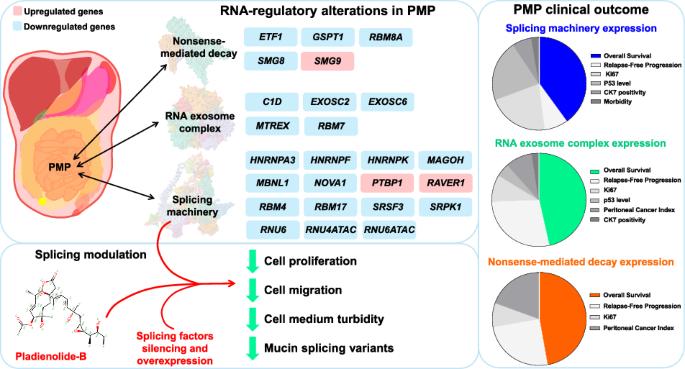在腹膜假性粘液瘤中探索RNA生物学揭示剪接失调是一种新的、可靶向的分子脆弱性。
IF 5
3区 医学
Q1 BIOTECHNOLOGY & APPLIED MICROBIOLOGY
引用次数: 0
摘要
摘要腹膜假性黏液瘤(PMP)是一种罕见的恶性肿瘤,具有不可控的黏液积聚,复发率高。RNA生物学过程已经成为癌症发展和进展的新参与者,然而它们在PMP中的作用仍然未知。在这项研究中,我们旨在研究PMP中的rna调控机制及其对该疾病进展的潜在贡献。我们使用微流控阵列分析了29例患者的62个剪接相关基因,27个RNA外泌体和21个无义介导的衰变基因,比较了肿瘤和对照/参考组织,并结合外部RNA-seq和蛋白质组学数据。我们的研究结果揭示了关键成分的严重失调,这与相关的临床参数相关,并使肿瘤和对照组织得以区分。Pladienolide-B体外剪接抑制以及特异性剪接因子的调节,降低了侵袭性参数,增强了临床使用药物的效果,揭示了失调基因与关键癌症相关基因之间的强相关性。这种抑制也影响粘蛋白分泌和粘蛋白变体的产生。总的来说,我们的发现为PMP中关键rna调控过程的基因失调提供了第一个证据,这意味着这些靶向机制可能在功能上发生改变并在该疾病中发挥作用。因此,对其RNA生物学的深入了解有助于发现这种罕见疾病的新的临床可操作的脆弱性。本文章由计算机程序翻译,如有差异,请以英文原文为准。

Exploring RNA biology in pseudomyxoma peritonei uncovers splicing dysregulation as a novel, targetable molecular vulnerability
Pseudomyxoma peritonei (PMP) is a rare neoplasm coursing with uncontrollable mucus accumulation, with a high relapse rate. RNA biology processes have emerged as new players in cancer development and progression, nevertheless their role in PMP remains unknown. In this study, we aimed to examine RNA-regulatory machineries in PMP and their potential contribution to this disease progression. We analyzed 62 splicing-related genes, 27 RNA exosome and 21 nonsense-mediated decay genes, in a cohort of 29 patients using a microfluidic array, comparing tumor and control/reference tissues, together with external RNA-seq and proteomic data. Our results revealed a profound dysregulation of key components, which correlated to relevant clinical parameters and enabled to distinguish between tumor and control tissues. In vitro splicing inhibition using Pladienolide-B, as well as the modulation of specific splicing factors, reduced aggressiveness parameters, enhanced the effect of clinically used drugs, and revealed a strong correlation between dysregulated genes and key cancer-related genes. This inhibition also affected mucin secretion and mucin variants production. Collectively, our findings provide the first evidence for dysregulation of the genes of pivotal RNA-regulatory processes in PMP, implying that these targetable mechanisms may be functionally altered and play a role in the disease. Hence, a thorough understanding of its RNA biology could aid in the discovery of new clinically actionable vulnerabilities in this rare disease.
求助全文
通过发布文献求助,成功后即可免费获取论文全文。
去求助
来源期刊

Cancer gene therapy
医学-生物工程与应用微生物
CiteScore
10.20
自引率
0.00%
发文量
150
审稿时长
4-8 weeks
期刊介绍:
Cancer Gene Therapy is the essential gene and cellular therapy resource for cancer researchers and clinicians, keeping readers up to date with the latest developments in gene and cellular therapies for cancer. The journal publishes original laboratory and clinical research papers, case reports and review articles. Publication topics include RNAi approaches, drug resistance, hematopoietic progenitor cell gene transfer, cancer stem cells, cellular therapies, homologous recombination, ribozyme technology, antisense technology, tumor immunotherapy and tumor suppressors, translational research, cancer therapy, gene delivery systems (viral and non-viral), anti-gene therapy (antisense, siRNA & ribozymes), apoptosis; mechanisms and therapies, vaccine development, immunology and immunotherapy, DNA synthesis and repair.
Cancer Gene Therapy publishes the results of laboratory investigations, preclinical studies, and clinical trials in the field of gene transfer/gene therapy and cellular therapies as applied to cancer research. Types of articles published include original research articles; case reports; brief communications; review articles in the main fields of drug resistance/sensitivity, gene therapy, cellular therapy, tumor suppressor and anti-oncogene therapy, cytokine/tumor immunotherapy, etc.; industry perspectives; and letters to the editor.
 求助内容:
求助内容: 应助结果提醒方式:
应助结果提醒方式:


